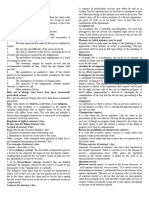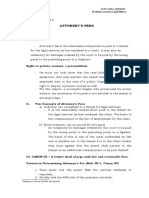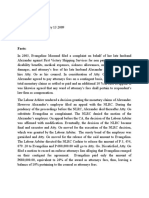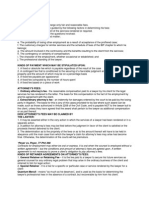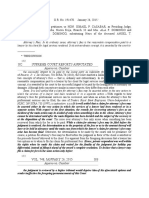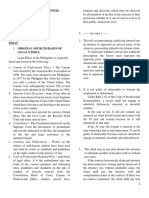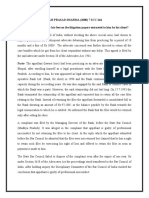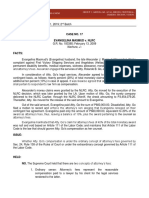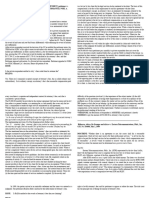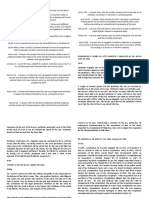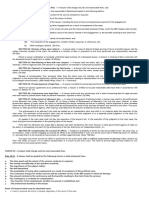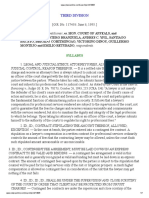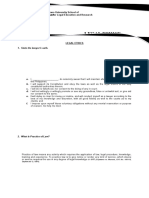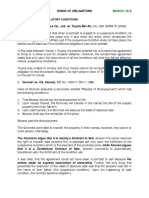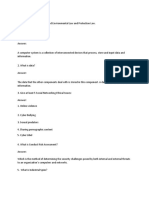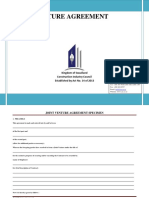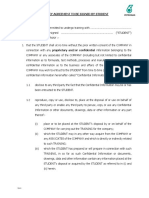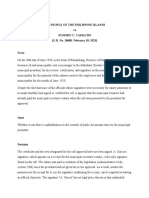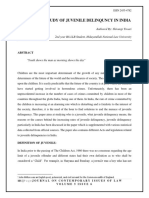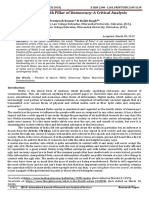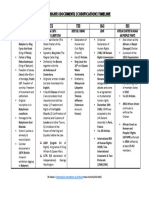UNIVERSITY
OF SAN CARLOS
SCHOOL OF LAW AND GOVERNANCE
College of Law
RELEVANT LAWS AND JURISPRUDENCE
(Problem Areas in Legal Ethics)
Module 4
Duties of a Lawyer (Part 1)
Concepts:
AMBULANCE CHASER Ø Concepts: ambulance chaser, barratry, champertous contract, forum shopping
Ambulance chasing, figuratively speaking, is the lawyers act of chasing an ambulance carrying the victim of an accident for the purpose of talking to said victim or relatives
and offeringg his legal services for the filing of a case against the person who caused the accident.
Ø Concepts: attorney’s fees (Bach v. Ongkiko Kalaw Manhit & Acorda Law Offices, G.R.
An ambulance chaser is a lawye who haunts hospitals and visits the homes of the afficted, officiously intruding their presence and persistently offering his service on the
basis of a contingent fee.
No. 160334, September 11, 2006; Metropolitan General Hospital Employees’
Association (MGHEA) v. Metropolitan General Hospital/United Doctors Services
Evils spawned by ambulance chasing (1) Fomenting of litigation with resulting burdens on the courts and the public (2) Subordination of perjury (3) Mulcting of innocent
Corporation, et al., G.R. No. 224665, Dec. 7, 2020), charging lien, contingent contract,
persons by judgments upon manufactured causes of actions (4) Defrauding of injured persons having proper causes of action but ignorant of legal rights and court
procedure quantum meruit, retaining lien
BARRATRY
-o- at law or otherwise. It is the lawyer’s act of fomenting suits among individuals and
Barratry is the offense of frequently exciting and stirring up quarrels and suits, either
offering his legal services to one of them for monetary motives or purposes
CHAMPERTOUS CONTRACT
A champertous contract is defined as a contract between a stranger and a party to a lawsuit, whereby the stranger pursues the party’s claim in consideration of receiving part
or any of the proceeds recovered under the judgment; a bargain by a stranger with a party to a suit, by which such third person undertakes to carry on the litigation at his
own cost and risk, in consideration of receiving, if successful, a part of the proceeds or subject sought to be recovered. (Blacks Dictionary; Schnabel v. Taft Broadcasting Co.,
Inc. Mo. App. 525 S.W. 2d 819, 823). An Agreement whereby the attorney agrees to pay expenses of proceedings to enforce the client’s rights is champertous. [JBP Holding
Corporation v. U.S. 166 F. Supp. 324 (1958)]. Such agreements are against public policy especially where as in this case, the attorney has agreed to carry on the action at its
own expense in consideration of some bargain to have part of the thing in dispute. [See Sampliner v. Motion Pictures Patents Co., et al., 225 F. 242 (1918). The execution of
these contracts violates the fiduciary relationship between the lawyer and his client, for which the former must incur administrative sanction. The intention of the law in
prohibiting this kind of contract is to prevent a lawyer from acquiring an interest in the subject of the litigation and to avoid a conflict of interest between him and his client.
(Hiers of Sotto v.. Palicte)
FORUM SHOPPING
There is forum shopping when the following elements are present, namely:
(a) identity of parties, or at least such parties as represent the same interests in both actions;
(b) identity of rights asserted and reliefs prayed for, the relief being founded on the same facts; and
(c) the identity of the two preceding particulars, such that any judgment rendered in the other action will, regardless of which party is successful, amounts to res judicata in
the action under consideration.
BACH V ONGKIKO
In the ordinary sense, attorney's fees represent the reasonable compensation paid to a lawyer by his client for the legal services rendered to the latter. On the other hand, in
its extraordinary concept, attorney's fees may be awarded by the court as indemnity for damages to be paid by the losing party to the prevailing party.
In ordinary attorney’s fees, the amount of attorney's fees due is that stipulated in the retainer agreement which is conclusive as to the amount of the lawyer's compensation.
In the absence thereof, the amount of attorney's fees is fixed on the basis of quantum meruit, i.e., the reasonable worth of the attorney's services. Courts may ascertain also if
the attorney's fees are found to be excessive, what is reasonable under the circumstances.18 In no case, however, must a lawyer be allowed to recover more than what is
reasonable.
SEC. 24. Compensation of attorney's fees; agreement as to fees.- An attorney shall be entitled to have and recover from his client no more than a reasonable compensation
for his services, with a view to the importance of the subject - matter of the controversy, the extent of the services rendered, and the professional standing of the attorney. No
court shall be bound by the opinion of attorneys as expert witnesses as to the proper compensation, but may disregard such testimony and base its conclusion on its own
professional knowledge. A written contract for services shall control the amount to be paid therefor unless found by the court to be unconscionable or unreasonable.
Contracts for attorney's services in this jurisdiction stands upon an entirely different footing from contracts for the payment of compensation for any other services.In order to
enable the court to ignore an express contract for attorney's fees, it is necessary to show, as in other contracts, that it is contrary to morality or public policy (Art.1255, Civil
Code). It is enough that it is unreasonable or unconscionable. (Emphases supplied.)
We have held that lawyering is not a moneymaking venture and lawyers are not merchants. Law advocacy, it has been stressed, is not capital that yields profits. The returns it
births are simple rewards for a job done or service rendered. It is a calling that, unlike mercantile pursuits which enjoy a greater deal of freedom from governmental
interference, is impressed with a public interest, for which it is subject to State regulation.
MGHEA V. METROPOLITAN GENERAL HOSPITAL
Atty. Nilong claims to have computed the amount of monetary claims owing to 400 mmembers of MGH notwithstanding his lack of experience in accounting. He also filed for
the motion for writ of execution and the negotiation of the amicable settlement of the unfair labor practice case filed against MGH. For these services, Atty. Nilong received
1.9M and the Court held it as reasonable and fair compensation. However, the additional 10% of the judgment award, as stipulated in their retainer contract, is too excessive
considering that it was not him who handled the trial of the unfair labor case.
CONTINGENT CONTRACT
A contingent fee arrangement is valid in this jurisdiction and is generally recognized as valid and binding but must be laid down in an express contract. The amount of
contingent fees agreed upon by the parties is subject to the stipulation that counsel will be paid for his legal services only if the suit or litigation prospers. A much higher
compensation is allowed as contingent fees in consideration of the risk that the lawyer may get nothing if the suit fails.
QUANTUM MERUIT
The rasonable worth of attorney’s services - such as: (1) when there is no express contract for the payment of attorney’s fees; (2) when there’s a formal contract, the fees are
unconscionable or unreasonable; (3) whenn the contract is void due to formal defects; (4) when the counsel was not able to finish the case to its conclusion due to justifiable
reasons; and (5) when the attorney and client disregard the contract.
In fixingg reasonable compensation for the services rendered by a lawyer on quantum meruit, the elements to be considred are generally (1) the importanc of the subject
matter, (2) the extennded of services rendered, and (3) the professional standing of the lawyer.
CHARGING LIEN and RETAINING LIEN (Rule 138, sec 37)
1
A retaining lien a passive lien and may not be actively enforced. It amounts to a mere right to retain his client’s papers that is lawfully in his possession as against the client
until the laywer is fully paid.
A charging lien is the equitable right of the attorney to annotate in the records the fees due him for services in a particular suit secured by the monetary judgment or recovery
in such suit. The object of the lien is to protect the claim on the fuirt of the lawyer’s labor. It may be execised on all judgments and executions which the attorney has secured
for his client in litigations.
